CHAK COMMUNE, Tbong Khmum — Po Hin Lean had only been home from the north for three days when he was shot dead in a rice field in the darkness of the night.
Footprints suggest he had been encircled. His corpse had bullet wounds in both thighs and his rear.
The killing, which struck a rural Tbong Khmum village early Sunday morning, was likely at the hands of police, and appears to be related to small-scale illegal fishing in flooded rice fields.
Six people — three police officers and three village guards — have been arrested pending negotiations with the victim’s wife, which may see them set free in exchange for compensation.
Locals are shocked by the death, criticizing police over what they see as disproportionate, needless violence. But further complicating the incident is the victim’s known support for the political opposition — a topic that shuts down conversations in the farming village amid abrupt signs of fear.
Gunshots
Ven Kimyi, the victim’s wife, woke up at 5 a.m. Sunday to find his cousin asking after her husband.
“Did uncle go out to fish? Has he come back?”
Hin Lean had left the house alone around 1 a.m. to look for fish in the village’s flooded rice fields. The fields will quickly dry up again in the next few days, but for brief stretches after heavy rains they fill up with knee-deep water and small fish. With the use of batteries and electric prods, by toiling in deep mud in the dead of the night, farmers can collect enough of the fish for some family meals.
Many farmers have been in the fields on recent nights, saying the fish only come out in the dark — though they also acknowledge that the early hour gives them cover for their heavy battery packs, which are banned for fishing.
The village heard gunshots sometime between 3 and 4 a.m. Some say they were immediately able to tell the shots weren’t firecrackers. Others couldn’t tell what they were or where they came from.
On Guard
After being alerted by the cousin, Kimyi rushed out into the fields and found two uniformed police officers and police tape strung around a patch of rice. It was still hard to see what was happening, but she knew it was bad.
“I asked to go in. And I cried. I wanted to go in,” Kimyi says. When she could tell there was a body in the fields, she asked the officers what clothes were on it. Two shirts, black and blue, and black pants.
“My husband was wearing that,” she says. “I looked from the distance and saw his body, and ran to his body and held him.”
One of the officers brought out a battery, as if to explain, she says.
Villagers waited for an examination of the body by two further officers, then finally carried the body out on a hammock.
“I told them to find justice for me,” Kimyi says, but the officers replied that it was a village guard who shot her husband. “They don’t have guns. I said: Only the police have guns. And they were quiet.”
Pring Village
Reporters speak to Kimyi on Tuesday afternoon at her house. Her yard has a white funeral tarp overhead, and many neighbors are gathered — and so is the village chief, Chhin Doeum, who chaperones the wife’s interview. Before long, a man who locals believe is a plainclothes police official also stands over the conversation and asks for reporters’ names.
The village is half an hour by car from a main road through deeply rutted dirt road and stretches of faded pavement. Political campaign banners of the ruling CPP, opposition Candlelight, royalist Khmer National United Party and minor Cambodian Youth Party are dotted around mostly wooden homes.
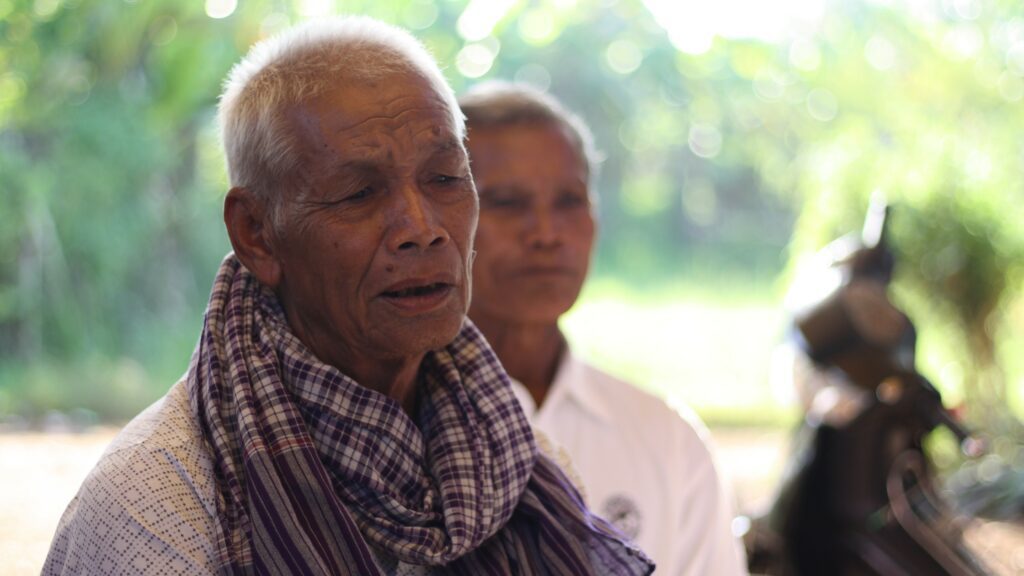
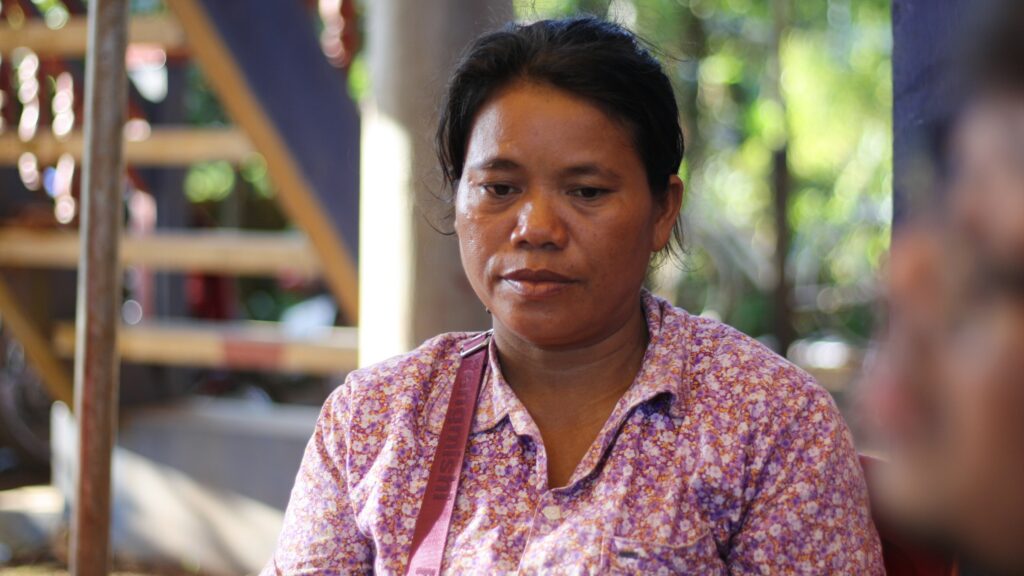
“Every year they shock the fish. They do it secretly every time there’s water. According to the law, using electricity isn’t allowed. They crack down,” village chief Doeum says.
But normally police would simply confiscate the batteries. He doesn’t try to justify the incident. “They shouldn’t shoot to kill,” he says.
A relative of the victim speaks up. “There’s nothing else to do besides this. In a few days there’ll be no water. It’s a rice field, not a lake.” Kimyi says her husband had been home for only three days after three months of working on a cassava plantation in Stung Treng.
The village chief is asked whether village guards have guns, and at first he objects, saying the victim’s wife has already answered. But when pressed, he agrees.
“Village guards have no guns because the law is very strict,” Doeum says. “I can guarantee they have no guns.”
Arrests
Chak commune chief Neang Pona says six people have now been detained at the provincial police headquarters: three commune police officers and three village guards.
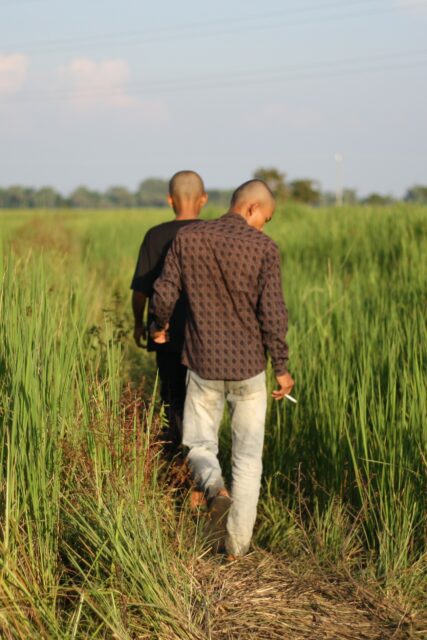
Authorities are working on a compromise with the victim’s family. Whether a court case will proceed against the six men could depend on what deal is reached, he says.
But the story is still unclear, he says. “We do not know what happened before the firing. They say that there was a scuffle with each other,” he says. It has not been made clear whether it was the police officers or village guards who fired the shots.
Pona adds that rice farmers had complained about their crops being trampled by fishermen, and police regularly patrolled the fields.
“They went too far and pulled the trigger,” Pona says. “It is very sad. Now safety in the village and commune is zero, and I have a headache. I’ve just been appointed commune chief.”
Tbong Khmum provincial police chief Mon Mekar and O’Reang Ou district police chief Vong Sophy could not be reached on Wednesday. Chak commune police chief An Sam Onn declined to comment.
Shadows
The victim’s son, grandson and two others guide reporters on narrow muddy tracks between flooded rice fields to where the body was found — a patch of stalks growing out of water, just the same as the rest of the fields except for a short bamboo pole marking the spot. The children, their heads shaved in mourning, pause and look into the water. The older child, a teenager, smokes a cigarette.
One of the other relatives comes out from the fields and says there are footprints in a circle around those of the victim.
In the village, an old neighbor says he heard the three gunshots in the middle of the night. “At that time I didn’t know what it was. My wife found out in the morning,” the neighbor says. “He was just a farmer. He was only catching fish to eat.”
When asked for his name, the neighbor stalls. “There’s no need for my name,” he finally says. He is worried, he says, because “we live here.”
Asked if the victim Hin Lean was an opposition member, the older man goes quiet. “I don’t know,” he says. “There aren’t many opposition supporters here.”
Pressure
Opposition supporters have faced heightened persecution in Tbong Khmum. Last year, the province had at least nine opposition activists in jail and eight others on the run.
And across the country, opposition activists have been attacked — more than 30 in five years, according to an opposition lawyer. Most of the attacks have involved unidentified assailants on motorbikes. Just last week, a Tbong Khmum man was beaten in Phnom Penh after attending a workshop with an NGO. Last year, an activist in Phnom Penh was slashed to death in a suspicious late-night incident on the Chroy Changva peninsula.
In Tbong Khmum, a jailed opposition activist’s wife previously said that supporters were being monitored and pressured.
“Everywhere we went, they followed us. At the farm they followed us. Going home they followed us. At every stop they followed us. .. I was tired of seeing them drive past the house, back and forth, back and forth,” the woman said last year.
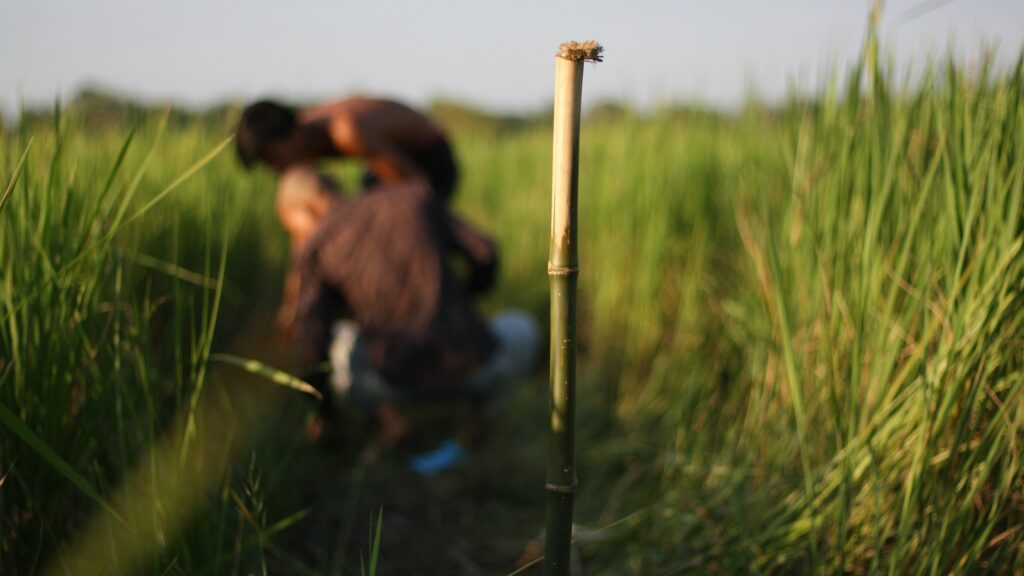
Sleepless
The police shooting in Pring village doesn’t neatly fit the pattern of violence, but the pressure being felt there is familiar.
In the village, residents freely talk about illegal fishing. One older man says he has weighed the illegal equipment at 22 kg, and complains that it is a young man’s game. But at two houses with Candlelight campaign banners, neighbors quickly shut down conversation as if politics is taboo.
Kimyi, the victim’s wife, speaks by phone again on Wednesday morning, saying she met with police the previous evening and there is an offer of $10,000 in compensation. She says she is negotiating, but her first priority is to find justice against the murderer of her husband. She says a deal to drop the case would be wrong.
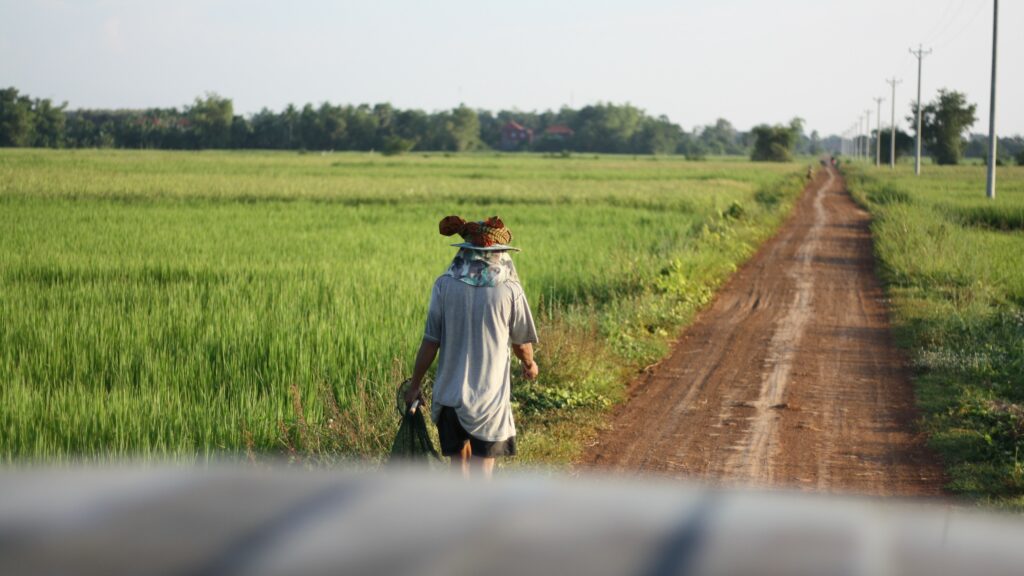
“I’m not agreeing to it because my husband died. I will go to the higher level. It’s inappropriate to do this.”
It isn’t clear in her mind whether politics played any role in his death. He was a supporter of the opposition since before they got married. They spoke about politics with each other, and local authorities knew he was involved.
“I joined the campaign too once. I sat in the car while they donated rice and water,” she says. She is unsure about it, but can’t stop thinking whether politics played a part.
“I think about it when I go to sleep,” she says. “I just don’t understand.”












